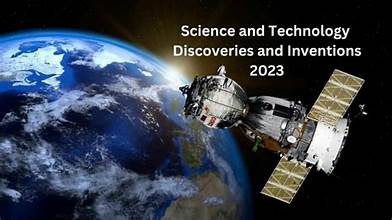
The realm of scientific discovery is ever-evolving, consistently pushing the boundaries of what we know about the universe and our place within it. September 2024 has proven to be a month of monumental advancements across various fields of science. From breakthroughs in quantum computing to significant strides in environmental conservation, the latest discoveries offer a glimpse into the future of technology, health, and our understanding of the natural world. In this article, we will explore the most groundbreaking scientific discoveries of September 2024, highlighting their potential impact and implications.
1. Quantum Computing Achieves New Milestones
One of the most anticipated developments in technology, quantum computing, has reached a new milestone this September. Researchers at the Quantum Computing Institute (QCI) have unveiled a prototype of a quantum processor that boasts a significant increase in computational power. This breakthrough, known as the QCI Quantum Processor 5.0, demonstrates an unprecedented level of qubit coherence, allowing for more stable and reliable quantum computations.
Implications and Impact:
The advancements in quantum computing are set to revolutionize various industries, including cryptography, drug discovery, and artificial intelligence. By performing complex calculations at speeds unattainable by classical computers, quantum processors could solve problems that were previously considered intractable. This development could accelerate the pace of scientific research and innovation, ultimately leading to new technologies and solutions to some of humanity’s most pressing challenges.
2. Breakthrough in Fusion Energy
Fusion energy has long been hailed as the “holy grail” of sustainable energy sources. This month, scientists at the International Fusion Research Center (IFRC) achieved a significant breakthrough with their latest fusion reactor design. The new reactor, known as ITER-2024, successfully sustained a fusion reaction for over 10 minutes, generating more energy than it consumed.
Implications and Impact:
The successful demonstration of sustained fusion reactions marks a critical step towards achieving practical and scalable fusion energy. If commercialized, fusion power could provide a virtually limitless and clean energy source, addressing global energy demands and reducing reliance on fossil fuels. The progress made in September 2024 brings us closer to realizing this transformative technology.
3. Advancements in AI-Powered Medical Diagnostics
Artificial intelligence continues to make waves in the medical field, and September 2024 has seen a groundbreaking development in AI-powered diagnostics. Researchers at the Advanced Medical AI Institute (AMAI) have introduced an AI algorithm capable of detecting early-stage cancer with unprecedented accuracy. The algorithm, named OncoDetect AI, utilizes advanced machine learning techniques to analyze medical imaging data and identify subtle patterns indicative of cancerous growths.
Implications and Impact:
The ability to detect cancer at its earliest stages can significantly improve patient outcomes and survival rates. OncoDetect AI’s high accuracy and early detection capabilities could lead to more effective and timely treatments, potentially saving countless lives. This development represents a major leap forward in the integration of AI technologies into healthcare and personalized medicine.
4. Breakthroughs in Genetic Engineering
September 2024 has also witnessed notable advancements in the field of genetic engineering. Scientists at the Genome Editing Research Center (GERC) have successfully developed a new gene-editing tool that offers enhanced precision and reduced off-target effects. The tool, known as CRISPR-X, utilizes a novel approach to modify specific genes with greater accuracy than previous methods.
Implications and Impact:
CRISPR-X’s improved precision opens new possibilities for treating genetic disorders and advancing research in genomics. The ability to target and modify specific genes with minimal unintended consequences could lead to breakthroughs in treating inherited diseases, developing personalized therapies, and advancing our understanding of the human genome.
5. Innovations in Climate Change Mitigation Technologies
Addressing climate change remains one of the most critical challenges of our time. In September 2024, scientists and engineers have unveiled several innovative technologies aimed at mitigating the effects of climate change. One notable development is the introduction of a new carbon capture and storage (CCS) system that offers higher efficiency and lower costs compared to existing technologies.
Implications and Impact:
The new CCS system could play a crucial role in reducing greenhouse gas emissions and combating global warming. By capturing and storing carbon dioxide from industrial processes and power plants, this technology can help lower atmospheric CO2 levels and contribute to climate change mitigation efforts. The advancements in September 2024 demonstrate a continued commitment to finding sustainable solutions for environmental challenges.
6. Discovery of Exoplanets in the Habitable Zone
In the quest to find potentially habitable planets beyond our solar system, astronomers have made a remarkable discovery this month. Using data from the latest space telescopes, scientists have identified several exoplanets located within the habitable zones of their respective star systems. These exoplanets, known as the “September Seven,” exhibit conditions that could potentially support life.
Implications and Impact:
The discovery of habitable-zone exoplanets is a significant step in the search for extraterrestrial life. By identifying planets with conditions similar to those on Earth, scientists can prioritize future observations and missions aimed at detecting signs of life. This discovery also enhances our understanding of planetary systems and the potential for life elsewhere in the universe.
7. Advancements in Space Exploration Technologies
Space exploration continues to push the boundaries of human knowledge and capabilities. In September 2024, NASA and international space agencies have unveiled a series of advancements in space exploration technologies. One highlight is the successful launch of the next-generation deep-space probe, Orion-X, designed to explore distant regions of our solar system and beyond.
Implications and Impact:
The Orion-X probe represents a major leap forward in space exploration, with advanced instrumentation and propulsion systems enabling it to travel further and gather more detailed data than previous missions. This advancement will provide valuable insights into the outer reaches of our solar system and contribute to our understanding of the cosmos.
Conclusion
September 2024 has been a month of extraordinary scientific advancements, with breakthroughs spanning various fields from quantum computing to space exploration. These discoveries not only push the boundaries of our knowledge but also hold the potential to transform our world in profound ways. As we continue to witness and support these innovations, we move closer to a future defined by progress, sustainability, and exploration. The groundbreaking achievements of this month underscore the relentless pursuit of knowledge and the ever-expanding horizons of human possibility.










